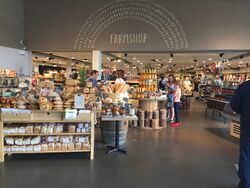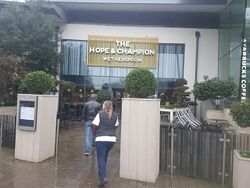Destination in its own right

The phrase "destination in its own right" was used from 1980 until 2013 by the Department of Transport and Highways Agency, to prohibit operators from providing any more than the most basic facilities. It was reinstated in 2022.
The phrase means that service areas can only provide facilities that would be needed by passing traffic, and nothing that would cause people to head out of their way to visit it. Quite literally, it can't be somebody's destination. This means no lavish hotels, no large shopping centres and no activity centres. The suggestion is that elaborate facilities will be overrun by visitors and would't be able to properly cater for passing traffic.
The rule stems from an original concern from the Ministry of Transport. The early motorway service areas were built using land acquired with a Compulsory Purchase Order to provide a vital facility for road users. If it turned out some of the land was being used to provide something that wasn't vital or wasn't for road users, an aggrieved neighbour could argue that the CPO had been abused.
In practice, the early motorway service areas did attract diners from the local area, but that was seen as merely a coincidence (and a very short-lived one). The rule was explained that operators shouldn't be offering anything that people would normally make a bespoke trip for, like selling furniture. Even so, many unusual events have been allowed to happen, especially in recent times.
When the government started selling the freehold of service areas in 1992, the rule was written in their service area policy, to ensure service areas continued to prioritise motorway traffic over locals. This addressed a second fear that a developer might be able to get around planning legislation by pretending to be building a service area, but actually operating it as a large supermarket.
Although A-road service area were never owned by the government, the 'destination in its own right' rule was later applied to them too, as a way of assessing whether a business proposal was appropriate or not. There are many legacy A-road service areas which started out as local garages, and may still provide this facility.
Resistance
While the rule was in place, service areas persistently argued that the rule stopped them providing profitable or popular facilities. Arguably most lodges were being marketed at people staying in the local area, so were acting as a destination in their own right, even though officially they said they were serving people who were already part-way through a journey.
One curious exception was Rheged Discovery Centre, which despite the rule, serves as both an official service area and "Cumbria's leading family day out".
In the early days of motorway service areas, they were frequently in trouble for provided unauthorised facilities. Granada were accused of running their services "like resorts", while Corley had a crazy golf course and Newport Pagnell was chastised for over-celebrating its 30th birthday.
A more recent example of the rule in action was the business case for Gloucester services. As it talked about specialising in high quality, local food, the Highways Agency warned that it may be about to become a destination. In the event by the time it opened the rule had been abolished, and many people have since confessed that they have used the motorway purely to visit Gloucester services.
People often ask why the major supermarket chains never took an interest in service stations. Although the two industries have some overlap, the destination in its own right ruling would have caused the supermarkets to look very different, among other issues.
Removal and Return

The regulations around service areas were reviewed in 2013, and this was one of many rules to be removed. The government at the time wanted businesses to invest to help the economy grow, and they made a lot of noise about how motorways could now play a key role in that.
Now service areas would have to prove that any ancillary facilities they build wouldn't affect their core purpose by still having enough parking spaces and toilets for tired drivers. They would also need to submit a transport assessment which shows that the roads around the service area would be able to safely accommodate the additional traffic. If those points were satisfied, both motorway and A-road service areas were free to build whatever additional facilities they liked, despite a vague reference in the policy to "low trip mileage".
In the following years service areas were built as part of business parks or new housing developments, and Extra started actively promoting their service areas to local residents with leaflets and billboards. Beaconsfield gained a pub in 2014, which was aimed more at residents than motorists.
The phrase "destination in its own right" was used by PizzaLuxe in October 2021, but this time they were talking about how they were intending their new branch at Peterborough to become a destination.
Reinstatement
The Department for Transport brought the rule back in their new 2022 regulations, specifying that only a "minimal overall increase in trip mileage" would be acceptable. This only applies to new and refurbished service areas, so the Extra sites will need to tread carefully when refurbishing, assuming the new rules are actually enforced. In addition, "further through access" remains prohibited; this means you shouldn't have a business or housing estate that is attached to a new service area.
Exceptions are now made for 'destinations' that are coach interchanges, park & ride sites, park & share sites, hotels, conference centres, business centres, or anything at a truckstop.
Interestingly, the new regulations also prohibit roadside facilities that don't meet the regulations from being built at a motorway junction. In theory, this could cause a problem if, say, a retail park with a petrol station wanted to be attached to a motorway junction.
Nothing has been said about food delivery apps, which require couriers to drive to service stations to pick up an order for somebody living locally. They may be able to argue that they should be treated like deliveries, even though they are making the very opposite of a delivery.
Ireland
While Ireland has never used the exact phrase "destination in its own right", the Irish service station policy does state that service areas should "avoid the attraction of short, local trips or the locations becoming destinations for local customers".